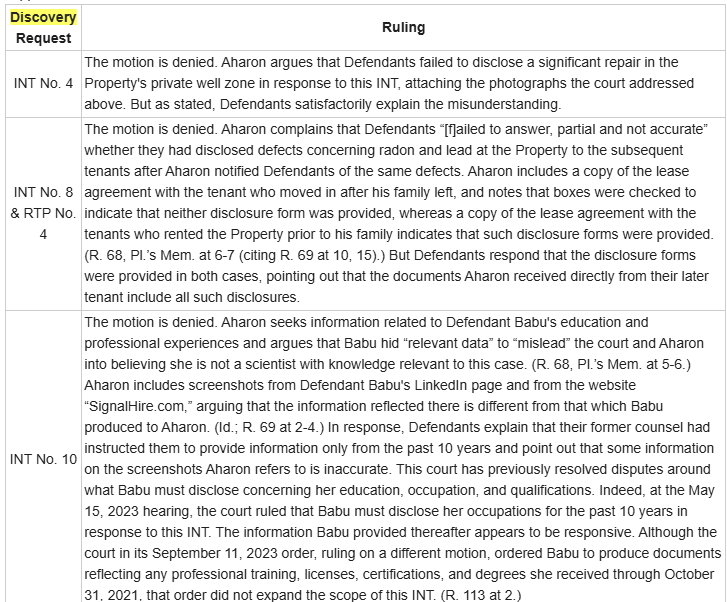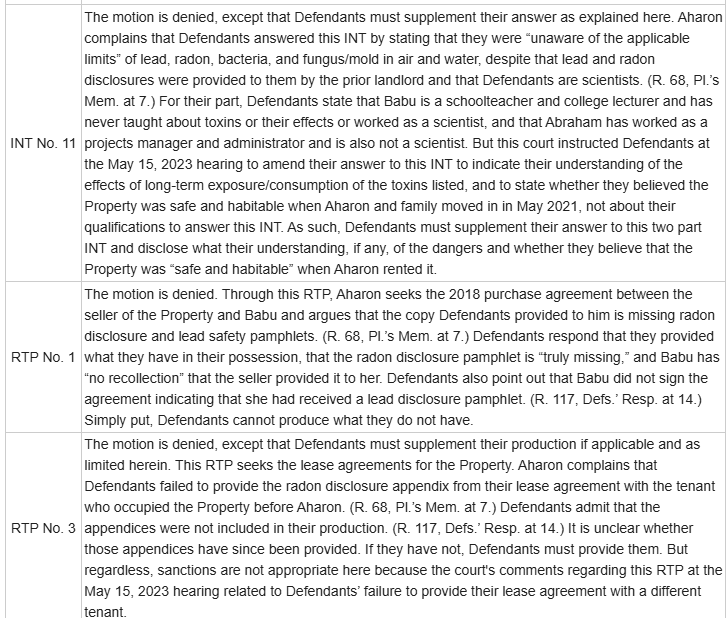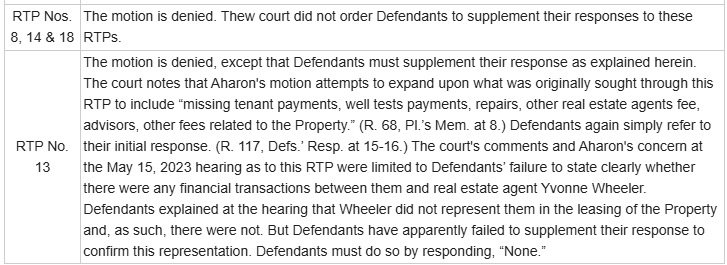Aharon v. Babu
Aharon v. Babu
2023 WL 12037915 (N.D. Ill. 2023)
October 27, 2023
Kim, Young B., United States Magistrate Judge
Summary
Plaintiff Refael Aharon filed a motion for sanctions against Defendants Susany Babu and Sonu Abraham for failing to comply with a court order to provide more fulsome responses to interrogatories and requests to produce, as well as failing to take certain actions in response to Aharon's request for inspection. The court declined to impose sanctions, finding that the Defendants had responded satisfactorily and ordering them to supplement their responses to only three specific requests.
Additional Decisions
REFAEL AHARON, ORI AHARON and ITAI AHARON, Plaintiffs,
v.
SUSANY BABU and SONU ABRAHAM, Defendants
v.
SUSANY BABU and SONU ABRAHAM, Defendants
No. 22 CV 4502
United States District Court, N.D. Illinois, Eastern Division, EASTERN DIVISION
Filed: October 27, 2023
Counsel
Kevin Abraham Rynbrandt, Kevin Abraham Rynbrandt, Attorney at Law, Grand Rapids, MI, for Plaintiffs.Refael Aharon, Ann Arbor, MI, Pro Se.
Michael Daehyun Lee, Kelleher + Holland, LLC, North Barrington, IL, for Defendants.
Susany Babu, Chicago, IL, Pro Se.
Sonu Abraham, Chicago, IL, Pro Se.
Kim, Young B., United States Magistrate Judge
ORDER
*1 Before the court is Plaintiff Refael Aharon's (“Aharon”) motion for sanctions against Defendants Susany Babu and Sonu Abraham. Aharon brings this action against his former landlords alleging that he and his children suffer health problems because of exposure to undisclosed toxins at their rental house in Naperville, Illinois (the “Property”). Aharon says Defendants were aware of the toxins yet failed to disclose or mitigate them even after Aharon complained and that, as a result, Aharon and his family moved out of the Property just months after moving in.
Aharon filed the current motion amidst a torrent of other discovery-related motions. He asserts that Defendants violated the May 15, 2023 order granting in part Aharon's motion to compel more fulsome responses to some of his interrogatories (“INTs”) and requests to produce (“RTP”), as well as directing Defendants to take certain action in response to Aharon's request for inspection. (R. 49; R. 53.) Aharon argues that Defendants failed to comply with that order and that sanctions are thus proper under Federal Rule of Civil Procedure 37(b)(2). He asks the court to bar Defendants—who, like Aharon, are now proceeding pro se—from introducing evidence he says should have been produced to him, hold them in contempt for “extreme” and “willful” noncompliance and “obstruction,” and order monetary sanctions and an adverse inference jury instruction against them. (R. 68, Pl.’s Mem. at 10.) For the following reasons, Aharon's motion is denied, except that Defendants are ordered to supplement certain discovery responses as explained herein:
Analysis
The court's authority to sanction a party stems from Rule 37(b), which permits sanctions against a party that “fails to obey an order to provide or permit discovery,” among other things, and a court's inherent power to “fashion an appropriate sanction for conduct which abuses the judicial process.” Chambers v. NASCO, Inc., 501 U.S. 32, 45 (1991). Available sanctions under Rule 37 range from a monetary award to dismissal of the case, Linda Dou v. Carillon Tower/Chicago LP, No. 18 CV 7865, 2020 WL 3036002, at *2 (N.D. Ill. June 5, 2020), but whether invoking Rule 37 or exercising its inherent power, sanctions must be “proportionate to the circumstances,” Donelson v. Hardy, 931 F.3d 565, 569 (7th Cir. 2019). As with all discovery matters, “[t]he issuance of sanctions under Rule 37 is in the discretion of the district court.” Eclipse Mfg. Co. v. M & M Rental Ctr., Inc., 496 F. Supp. 2d 937, 940 (N.D. Ill. 2007) (citing Melendez v. Ill. Bell Tel. Co., 79 F.3d 661, 670-71 (7th Cir. 1996)). The court declines to exercise that discretion here.
The court begins with Aharon's request for inspection. At the May 15, 2023 hearing on Aharon's motion to compel, Aharon explained that he wanted to photograph the same areas depicted in the approximately 200 photographs took of various areas of the Property while residing there so he could determine whether improvements have been made or warnings posted after his family moved out. The court denied Aharon's request given its scope and because it saw no need for Aharon himself to take the photographs. However, the court directed Aharon to submit a reasonable number of his photographs to Defendants so that they could photograph the areas depicted therein and ordered Defendants to produce the photos to Aharon. Aharon asserts that he provided 48 such photographs to Defendants but argues that Defendants’ corresponding photographs are “non-matching,” “manipulated,” “avoid[ ] ... relevant parts,” and were taken “long after the current tenant left, after changes, not ‘as is.’ ” (R. 68, Pl.’s Mem. at 4.) Aharon further accuses Defendants of acting “without verification of lawyers,” and argues that their behavior constitutes “[t]otal failure and obstruction of the legal procedure.” (Id.)
*2 Defendants deny any wrongdoing, including any editing of the photos they took, and explain that not only was their tenant still occupying the Property when they took the photos, but also that their attorneys—who have since withdrawn from this case—viewed the photos before producing them to Aharon. (R. 117, Defs.’ Resp. at 7.) This court has no reason to doubt Defendants’ representations, and Aharon has not provided any facts to suggest otherwise. Defendants responded satisfactorily to the only specific assertion Aharon makes about the photos produced—explaining that the photos show improvements made by Will County, not Defendants, and that the area repaired is not part of the Property. (See id. at 7-8.)
The court next addresses Defendants’ responses to Aharon's INTs and RTPs[1] that Aharon asserts do not comply with the court's May 15, 2023 order. In that order, the court directed Defendants to supplement their responses to INT Nos. 2-4, 7, 8, 10, and 11, and RTP Nos. 1, 3, 4, 7, 13, and 16. But as described here, Aharon asserts that Defendants’ responses to INT Nos. 4, 8, 10, and 11, and RTP Nos. 1, 3, 4, and 13 are still inadequate, and also complains about Defendants’ responses to RTP Nos. 8, 14, and 18 as to which the court did not order supplementation:



In addition to his objections regarding matters addressed at the May 15, 2023 hearing, Aharon asserts various “[o]ther reasons for sanctions.” (R. 68, Pl.’s Mem. at 8.) First, Aharon complains that Defendants’ representation in a June 2023 status report that Aharon “refuse[d] to participate meaningfully in attempts to meet and confer regarding discovery issues” was “a complete lie.” (Id. at 8) (quoting R. 65 at 6 (Defs.’ June 2, 2023 status report).) Second, Aharon asserts that Defendants threatened him with a lawsuit if he approached the tenant who leased the Property after he and his family moved out. (Id.) Defendants deny threatening Aharon in any way despite receiving multiple complaints from the same tenant and other third parties regarding Aharon's allegedly harassing conduct toward them. (R. 117, Defs.’ Resp. at 17.) Third, Aharon argues that Defendants “lack ... integrity” given their conduct underlying this lawsuit and accuses them without factual support that it is “more than likely that [they] deleted or manipulated ESI.” (R. 68, Pl.’s Mem. at 9.) But Aharon fails to demonstrate how these assertions support sanctions under Rule 37.
Conclusion
For the foregoing reasons, Aharon's motion for sanctions is denied. However, Defendants are ordered to supplement their responses to INT No. 11 and RTP Nos. 3 and 13 as explained herein.
Footnotes
Aharon asserts that Defendants’ response to Request No. 5 from his second set of document requests is also implicated here. But the court dealt only with Aharon's initial discovery requests during the May 2023 hearing and, in any case, the court already ruled that Defendants are not required to respond to written discovery requests Aharon served on them after the April 15, 2023 deadline. (See R. 97; R. 112.) As such, Aharon's motion is denied summarily to the extent it concerns Defendants’ responses to his untimely served discovery requests without leave of court.